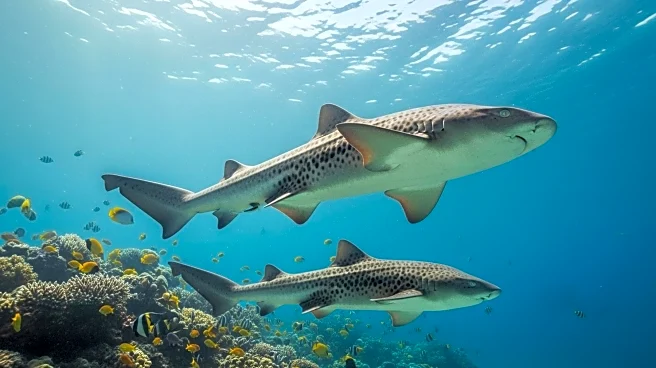What is the story about?
What's Happening?
A university researcher has captured footage of leopard sharks mating in the wild off New Caledonia, marking the first recorded observation of two males of the globally endangered species mating in quick succession with a female. This event is significant as it provides rare insight into the reproductive behavior of leopard sharks, a species that has been facing population declines due to overfishing and habitat destruction. The footage showcases a 'threesome' interaction between two male leopard sharks and a female, offering valuable data for scientists studying marine life and conservation efforts.
Why It's Important?
The documentation of leopard sharks mating in their natural habitat is crucial for understanding the species' reproductive strategies and potential for recovery. As leopard sharks are globally endangered, insights gained from such observations can inform conservation strategies aimed at protecting and revitalizing their populations. This development is a positive sign amidst broader concerns about shark extinction trends, where many species continue to face threats from human activities. The footage could help raise awareness about the importance of marine conservation and the need to address overfishing and habitat destruction.
What's Next?
The captured footage is expected to contribute to ongoing research and conservation efforts focused on leopard sharks and other endangered marine species. Researchers may use this data to advocate for stronger protective measures and policies to safeguard shark habitats. Additionally, the findings could stimulate further studies on the mating behaviors of other shark species, potentially leading to more comprehensive conservation strategies. Stakeholders, including environmental organizations and policymakers, may respond by increasing efforts to mitigate human impacts on marine ecosystems.
Beyond the Headlines
This event highlights the complex dynamics of marine life and the challenges faced in conserving endangered species. The mating behavior observed could lead to discussions on the ethical implications of human interference in natural habitats and the importance of preserving biodiversity. Long-term shifts in conservation approaches may be triggered by such findings, emphasizing the need for sustainable practices that balance human activities with ecological preservation.















